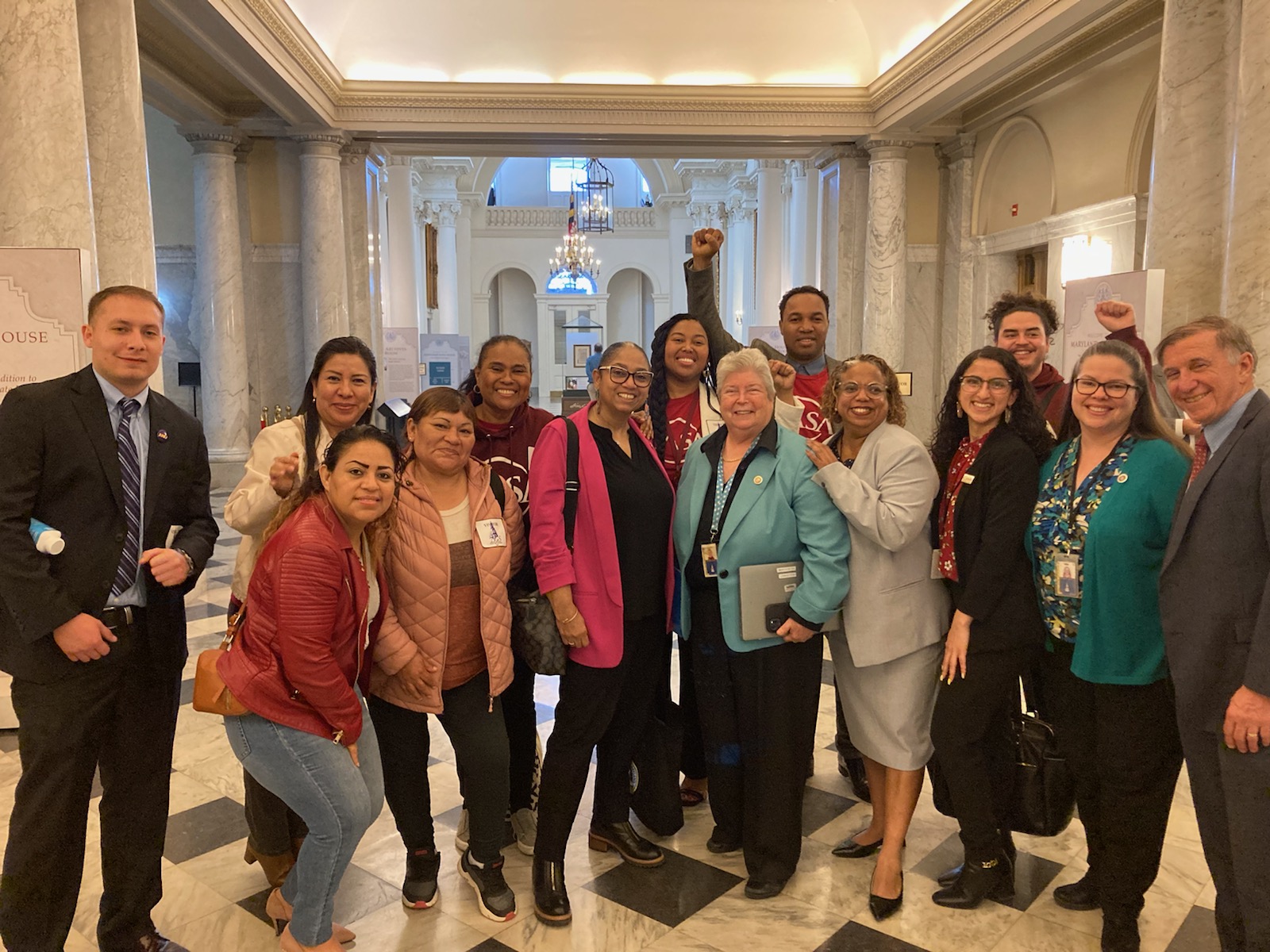In Maryland legislature, liquor tax passes, immigrant tuition deal reached
The Washington Post
April 12, 2011
By John Wagner, Aaron C. Davis and Ann E. Marimow
The Democratic-led Maryland General Assembly strong-armed through a tax increase on alcohol in the final hours of its 90-day session Monday while voting to grant undocumented immigrants a break on college tuition.
The action on the two-high profile issues came on a chaotic day during which lawmakers scrambled to complete work on dozens of bills before the legislature’s midnight adjournment.
The late-session bid to raise the sales tax on alcohol from 6 percent to 9 percent on July 1 brought howls of protest from Republicans, who accused House Democratic leaders of running roughshod over the chamber’s rules to enact the tax increase.
The approximately $85 million generated from the alcohol tax increase would be earmarked next year for disabilities programs and for school operating and construction costs — all priorities in a tough budget year for Democratic lawmakers, who hold large majorities in both chambers.
“Tyranny rises again, doesn’t it?” said Del. Donald Dwyer (R-Anne Arundel) during debate over the second of two bills needed to raise the alcohol tax . “Once again, we’ve been stuffed. We’re not honoring democracy.”
By a 26 to 19 vote, the Senate approved the final bill to put the plan in place shortly after 10:30 p.m.
At a time when many states are curtailing immigrants’ rights, both the House and Senate signed off on a compromise plan that will allow undocumented students who have graduated from Maryland high schools to pay in-state tuition at the state’s colleges.
Lawmakers also gave Gov. Martin O’Malley (D) a much-needed win on one of his legislative priorities, a bill that would steer about $70 million into public and private venture-capital programs.
That is smaller than the $100 million O’Malley had proposed to pool from insurance companies that agree to prepay their taxes at a discounted rate. But he and Democratic allies said the fund would help create jobs.
The Senate passed the bill 34 to 12, turning aside Republican objections that the plan was too complicated to be considering on the session’s final day. The House later voted 92 to 43 for the bill.
The flurry of activity came at the end of a 90-day session that had been more notable for its legislative failures than successes. Last month, a bill to legalize same-sex marriage fell a few votes short in the House.
Lawmakers also failed to embrace two of O’Malley’s other leading priorities: legislation to spur offshore wind development and to limit construction of most new septic systems to reduce pollution leaching into the Chesapeake Bay.
“I think the size of the one and the sweep of the other made the General Assembly kind of choke on those and refer them to summer study,” O’Malley said in a briefing with reporters.
That assessment rubbed some legislative leaders the wrong way.
Senate President Thomas V. Mike Miller Jr. (D-Calvert) said the governor would have been wise to have “choked” before surprising lawmakers by announcing his plan to curtail septics in his State of the State address.
On offshore wind, Miller complimented O’Malley for proposing an ambitious plan but said the governor “couldn’t explain who was going to benefit.” The bill would have forced utilities to buy wind energy at a premium and then divide the higher cost among ratepayers.
Even as O’Malley said he was disappointed in the failure of those measures, he said he would be working the phones and meeting with lawmakers to salvage elements of his agenda.
With only an hour to spare Monday night, the House gave final passage to one of those — a bill to create reliability standards for Pepco and other utilities in response to a series of extended outages, mostly in Washington’s Maryland suburbs. The bill, which would impose penalties of up $25,000 per day when standards are not met, passed on a vote of 113 to 22, prompting loud cheers from the Montgomery delegation on the floor.
The governor also helped to save a bill to provide operating subsidies to horse-racing tracks, saying it was important for maintaining jobs in Maryland’s horse industry.
Several of the governor’s lesser-known bills, including one setting up a framework for an insurance exchange under President Obama’s health-care reform, had passed or were on track to pass. O’Malley has also claimed credit for reforms to state worker pensions.
On Monday night, Senate and House negotiators successfully resurrected the in-state tuition bill that earlier in the day had been declared dead.
Negotiators from the House and Senate agreed to strip the bill of language that opponents said would make it too easy for students or their parents to avoid providing proof of income tax filing as the measure requires.
Under the legislation, students would pay in-state rates at community colleges first and then could transfer to a four-year institution after getting an associate’s degree and get the in-state rate. The measure passed the Senate 27 to 19. The House approved 74 to 65.
Immigrant-rights advocates and dozens of students who would benefit from the bill watched from the House gallery, and erupted in cheers and applause after the final vote. Wearing T-shirts with the message, “I am the Maryland Dream Act,” the students lined the hallway outside the chambers to thank legislators.
On Monday afternoon when the House passed the first of two bills to raise the alcohol tax, almost every delegate opposed to the plan used a privilege to spend two minutes explaining his or her vote on the floor. This tied up the chamber for more than two hours, as a mostly partisan fight ensued — with some rural Democrats siding with Republicans .
The spectacle at times resembled a game of legislative Whac-a-Mole. House Speaker Michael E. Busch (D-Anne Arundel) would let an opponent speak for two minutes, only to see a half-dozen more around the room spring to their feet to demand the next two minutes.
Republicans built a litany of arguments against the increase. Their complaints revolved mainly around a notion that the Democratic majority had “met in the back room” and divvied up “the spoils” of the planned tax increase to benefit urban areas.
On Monday night, when the House took up the second bill, Busch chose not to recognize delegates as they repeatedly yelled out “Mr. Speaker,” trying to draw his attention so that they could explain their votes. A Democratic delegate who served as parliamentarian ruled that Busch had the right to ignore them because bill opponents were deliberately using repetitive tactics to slow down the bill.
Earlier onMonday, the Senate killed a measure that sought to extend anti-discrimination protections to transgender people. On a vote of 27 to 20, the chamber sent a bill back to committee that would have offered protections in housing, employment and lending. The measure passed the House two weeks ago.
Equality Maryland, the state’s leading lesbian, gay, bisexual and transgender rights lobby, said it was “appalled” by the Senate action.
Meanwhile, a bill designed to protect severely ill Marylanders who use medical marijuana for medical purposes was shipped to the governor late Monday. The Senate gave final passage to the measure, which allows patients to use their illness as a legal defense, on a 39 to 7 vote.
Environmentalists who typically hold considerable sway with Maryland’s Democratic majority saw their losses compounded as time ran out in the session. In addition to rejecting O’Malley’s offshore wind plan in recent days, the legislature late Monday approved a measure to classify incineration of solid waste as a renewable energy source on par with that of solar and wind.
The Sierra Club, Environment Maryland and others warned that bill would amount to “cheating” on Maryland’s law to generate 20 percent of its energy from renewable resources. A measure backed by environmentalists that died in the Senate would have created a near moratorium on drilling for natural gas in an underground rock formation in Western Maryland.
Last modified: April 12, 2011




